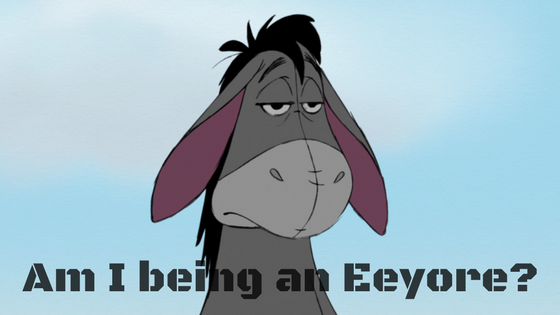A new client asked me on Monday what I meant by saying “There’s a balance in everything.
But often we only see one side.”
I asked her to think of something she thought had been positive.
She talked about a lovely dinner she’d had out with her partner.
Great food, lovely atmosphere, time to talk…..
As I asked her a few questions, she acknowledged a few ‘downsides’
-
the meal had cost more than they had planned, upsetting their budget
-
the waiter had spilt drops of red wine onto her good jacket
-
she came home to finish work emails and tidy her kitchen
-
she was tired at work the next day
Does this mean I’m being like Eeyore and not looking on ‘the bright side’?

Am I trying to spoil a lovely memory?
No, it means I’m helping my client to see the balance in that event.
I then asked her to look at a time she’d thought was negative.
She recalled a colleague making a rude remark about her work.
I asked her about the upsides of that event.
-
she received some support from a new member of the team, building a connection
-
she didn’t offer to assist the other colleague with his jobs as she would normally
-
she then had time to do some filing and was able to tidy her workspace
-
this allowed her to feel more calm and organised before an important meeting
-
the meeting was very productive and created new work opportunities
So the lovely dinner isn’t a ‘good’ thing, nor is the criticism a ‘bad’ thing.
They are both just ‘things.’ Just events. Both have upsides and downsides.
The more we are able to see both sides of a situation, the greater the control we have over how we respond.
If we fantasise about the ‘good’ times, we can spend time and energy hankering for more.
We can also be disappointed and resentful about times that don’t meet our expectations.
If we are reacting to what we perceive to be negative, we miss an opportunity to see how the situation can be of benefit to us.
When we are balanced in our outlook and expectations, we have far greater control over how we respond. We have less mood swings and more even emotions.
Doesn’t that sound appealing?


